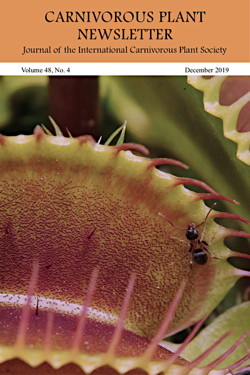International Carnivorous Plant Society
Carnivorous Plant Newsletter Archive
Dionaea traps selectively allow small animals to escape
Siegfried R. H. Hartmeyer and Irmgard Hartmeyer and Stephen E. Williams
Carniv. Pl. Newslett. 48(4):153-160
Published 8 November 2019
https://doi.org/10.55360/cpn484.sh674
Summary
Dionaea muscipula selectively allows small animals to escape using a system of interlocking features that complement each other very efficiently. Ants of the species Lasius neglectus (length 3.5 mm) ran through open traps, pausing on the alluring glands along the rim of the trap moving their mouthparts over them. Analysis of videos revealed the ants primarily passed along the trap rim, over the alluring glands, but sometimes ran down to the leaf base through the trigger hairs occasionally brushing by a hair without triggering the trap, because they did not deliver the two stimuli needed to trigger trap closure.
Traps observed for four weeks were estimated from sampled observations to have had a total of about 15,000 trap visits by ants during this time period. Six ants were captured during four weeks indicating a risk of capture of about 0.04%. During this same period ten prey other than ants were captured. Visits for prey other than ants was mostly nocturnal and so low that no visits were observed during the observation period. Compared with the large number of ant visits all other prey visits were orders of magnitude fewer. The selective system that allows small animals to escape includes:
1) Attraction of the ants away from the trigger hairs by alluring glands.
2) Clear visibility of the trigger hairs to a 3.5 mm ant.
3) The requirement of two stimuli for triggering trap closure.
4) The escape allowed for small animals by openings between the marginal bristles during the slower phase of trap closure that follows the rapid snap of the trap.
Since ants are known to compose about one third of the captures by Dionaea in its native habitat, selection against the capture of small ants not worth the energy expenditure by the plant is an adaptive mechanism.
Traps observed for four weeks were estimated from sampled observations to have had a total of about 15,000 trap visits by ants during this time period. Six ants were captured during four weeks indicating a risk of capture of about 0.04%. During this same period ten prey other than ants were captured. Visits for prey other than ants was mostly nocturnal and so low that no visits were observed during the observation period. Compared with the large number of ant visits all other prey visits were orders of magnitude fewer. The selective system that allows small animals to escape includes:
1) Attraction of the ants away from the trigger hairs by alluring glands.
2) Clear visibility of the trigger hairs to a 3.5 mm ant.
3) The requirement of two stimuli for triggering trap closure.
4) The escape allowed for small animals by openings between the marginal bristles during the slower phase of trap closure that follows the rapid snap of the trap.
Since ants are known to compose about one third of the captures by Dionaea in its native habitat, selection against the capture of small ants not worth the energy expenditure by the plant is an adaptive mechanism.
Keywords: Dionaea muscipula, ants, Lasius neglectus, trap mechanism
Article Citation
Siegfried R. H. Hartmeyer and Irmgard Hartmeyer and Stephen E. Williams. 2019. Dionaea traps selectively allow small animals to escape. Carniv. Pl. Newslett. 48(4):153-160. https://doi.org/10.55360/cpn484.sh674
Page views: 1295
©2025 International Carnivorous Plant Society
www.carnivorousplants.org
This page is maintained by John Brittnacher.
Please contact us at our membership website, icps.clubexpress.com.
Privacy: The Carnivorous Plant Newsletter Archive website does not track users.

